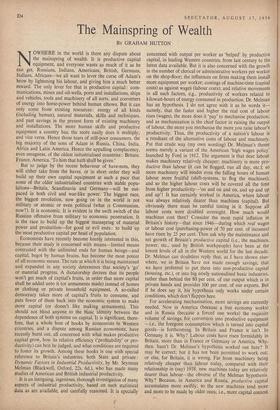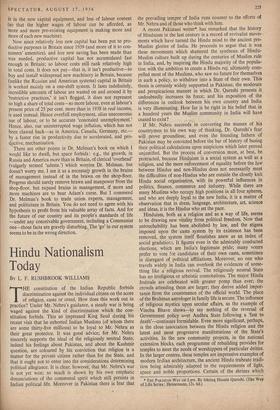The Mainspring of Wealth
BY GRAHAM HUTTON NOWHERE in the world is there any dispute about the mainspring of wealth. It is productive capital equipment, and everyone wants as much of it as he can get. Russians, Indians, Americans, British, Germans, Italians, Africans—we all want to lever the curse off Adam's brow by lightening his labour, and giving him a much better reward. The only lever for that is productive capital : com- munications, mines and oil-wells, ports and installations, ships and vehicles, tools and machinery of all sorts, and converters of energy into horse-power behind human elbows. But it can only come from existing resources : energy of all kinds (including human), natural materials, skills and techniques. and past savings in the present form of existing machinery and installations. The more human skills and productive equipment a country has, the more easily does it multiply; and vice versa. Hence those tears of still-poor consumers. the big majority of the sons of Adam in Russia, China. India. Africa and Latin America. Hence the appalling complacency, even smugness, of the oldest industrialised countries : Britain. France, America. 'To him that hath shall be given.'
But to judge by the recent behaviour of have-nots, they will either take from the haves, or in short order they will build up their own capital equipment at such a pace that some of the older industrialised countries with stable popu- lations—Britain, Scandinavia and Germany—will be out- paced in both civil and war-like power. The biggest race, the biggest revolution, now going on in the world is not military or atomic or even political (what is Communism, now?). It is economic. It is evident in the swift switch of the Russian offensive from military to economic penetration. It is the race to build up the biggest mainspring of material power and production—for good or evil ends : to build up the most productive capital per head of population.
Economists have recently become keenly interested in this. because their study is concerned with means—limited means contrasted with the unlimited ends for human beings—and capital. begot by human brains. has become the most potent of all economic means. The rate at which it is being maintained and expanded in any society . determines that society's 'go' or material progress. A dictatorship decrees that its people won't get much of capital's fruits, in order that more capital shall be added unto it (or armaments made) instead of homes or clothing or private household equipment. A so-called democracy takes more of capital's fruits to consume, and puts fewer of them back into the economic system to make more capital (or doesn't like making armaments). This should not blind anyone to the basic identity between the dependence of both systems on capital. It is significant, there- fore, that a whole host of books by economists in Western countries, and a dispute among Russian economists, have recently burst out, all concerned with what makes productive capital grow, how its relative efficiency (`profitability' or pro- ductivity) can best be judged. and what conditions are required to foster its growth. Among these books is one With special reference to Britain's industries, both State and private : Dynamic Factors in Industrial Productivity, by Mr. Seymour Melman (Blackwell, Oxford, 22s. 6d.), who has made many studies of American and British industrial productivity.
It is an intriguing, ingenious, thorough investigation of many aspects of industrial productivity, based on such statistical data as are available, and carefully reasoned. It is specially concerned with output per worker as 'helped' by productive capital, in leading Western countries, from last century to the latest data available. But it is also concerned with the growth in the number of clerical or administrative workers per worker on the shop-floor; the influences on firms making them install more equipment per worker; costings of machine-time (capital costs) as against wages (labour costs); and relative movements in all such factors, e.g., productivity of workers related to kilowatt-hours of energy consumed in production. Dr. Melman has an hypothesis. 1 do not agree with it as he words it— namely, that the faster and higher the real cost of labour rises (wages), the more does it 'pay' to mechanise production; and as mechanisation is the chief factor in raising the output of labour, the more you mechanise the more you raise labour's productivity. Thus, the productivity of a nation's labour is a resultant of the alternative costs of labour and machinery. Put that crude way (my own wording) Dr. Melman's theme seems merely a variant of the American 'high wages policy' launched by Ford in 1912. The argument is that dear labour makes machinery relatively cheaper; machinery is more pro- ductive than labour (it can be flogged, run all day, etc.); so more machinery will render even the falling hours of human labour more fruitful (shift-systems, to flog the machines); and so the higher labour costs will be covered all the time from higher productivity—`on and on and on, and up and up and up'! It has certainly worked in America, where labour was always relatively dearer than machines (capital). But obviously there must be careful timing in it. Suppose all labour costs were doubled overnight. How much would machines cost then? Consider the most rapid inflation in Britain's history—that since 1946—during which real wages or labour cost (purchasing-power of 70 per cent. of incomes) have risen by 25 per cent. Then ask why the maintenance and net growth of Britain's productive capital (i.e., the machines, power, etc., used by British workpeople) have been at the lowest levels of all in the Western world for the last decade. Dr. Melman can doubtless reply that, as I have shown else- where, we in Britain have not made enough savings; that we have preferred to put them into non-productive capital (housing, etc.), or into big newly nationalised basic industries, rather than behind the 80 per cent. of our output which is in private hands and provides 100 per cent. of our exports. But if he does say it, his hypothesis only works under certain conditions, which don't Happen here.
For accelerating mechanisation, more savings are currently needed. Now in America (because a free economy works) and in Russia (because a forced one works) the requisite volume of savings, for conversion into productive equipment —i.e., the foregone consumption which is turned into capital goods—is forthcoming. In Britain and France it isn't. In Germany it is. Why? Labour costs have risen formidably in Britain, more than in France or Germany or America. Why, then. hasn't Dr. Melman's hypothesis worked out here? It may be correct; but it has not been permitted to work out; or else, for Britain, it is wrong. Far from machinery being relatively cheaper than Jabour today, compared with their relationship in (say) 1938, new machines today are relatively dearer than labour—the obverse of the Melman hypothesis. Why? Because, in America and Russia, productive capital accumulates more swiftly; so the new machines tend more and more to be made by older ones; i.e., more capital content is in the new capital equipment, and less of labour content (so that the higher wages of labour can be afforded, as more and more pre-existing equipment is making more and more of each new machine).
Now since relatively less new capital has been put to pro- ductive purposes in Britain since 1939 (and more of it to con- sumers' amenities), and less new saving has been made than was needed, productive capital has not accumulated fast enough in Britain; so labour costs still rank relatively high in total costs. It does not pay—that is, it isn't productive—to buy and install widespread new machinery in Britain, because (unlike the Russian and American systems) capital in Britain is worked mainly on a one-shift system. It lasts indefinitely, incredible amounts of labour are wasted on and around it by `restrictive practices,' it isn't flogged, it does not represent so high a share of total costs—so more labour, even at labour's present price of 25 per cent. more than in 1938 in real income, is used instead. Hence overfull employment, alias uneconomic use of labour, or to be accurate 'concealed unemployment.' Hence, also, our uninterrupted wage inflation, which has not been clawed back—as in America, Canada, Germany, etc.— by a faster rise in productivity due to accelerated, and pro- ductive, mechanisation.
There are other points in Dr. Melimn's book on which I would like to dwell, but space forbids : e.g., the growth, in Russia and America more than in Britain, of clerical 'overhead' (vulgarly termed 'admin.') which worries Dr. Melman, but doesn't worry me. I see it as a necessary growth in the brains of management instead of in the brawn on the shop-floor. Progress should surely remove brawn and manpower from the shop-floor, but expand brains in management, if more and more machines are to bear Adam's curse. But I commend Dr. Melman's book to trade union experts, management, and politicians in Britain. You do not need to agree with his hypothesis to profit from his valuable array of facts. And for the future of our country and its people's standards of life —under any conceivable government, including a Communist one—those facts are gravely disturbing. The 'go' in our system seems to be in the wrong direction.



































 Previous page
Previous page